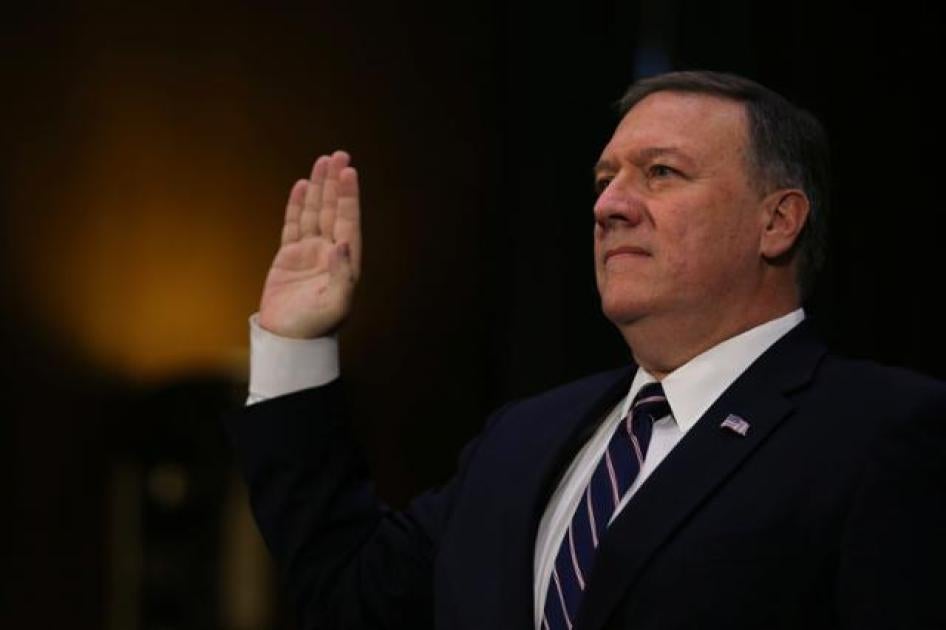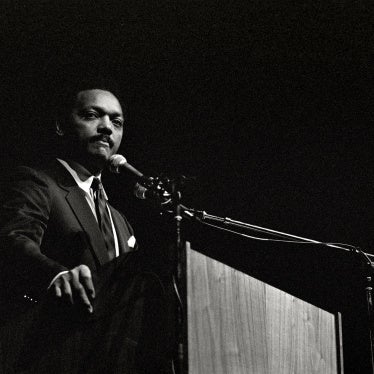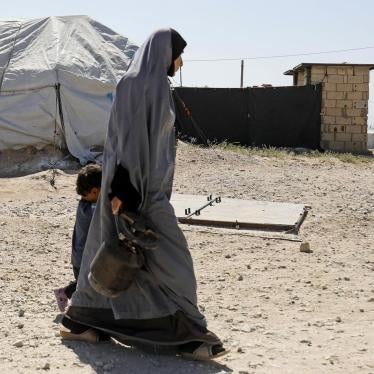(Washington) – United States Senators should vote against the confirmation of Rep. Mike Pompeo as director of the Central Intelligence Agency due to overriding concerns that he would use the agency’s surveillance and other powers in ways likely to violate rights on a broad scale, Human Rights Watch said today.
Mass Surveillance
Pompeo co-authored a January 2016 opinion article in the Wall Street Journal lamenting the adoption of the USA Freedom Act of 2015, though he had voted for that act. The law restricted the National Security Agency (NSA) from systematically gathering Americans’ telephone records. In the article, he urged Congress to “pass a law re-establishing collection of all metadata” – that is, records of communications, such as their dates, parties, and durations – “and combining it with publicly available financial and lifestyle information into a comprehensive, searchable database.”
In response to written questions from the Senate Select Committee on Intelligence prior to his confirmation hearing, Pompeo stated that he “ha[d] not changed” his position in support of restoring the blanket telephone metadata surveillance program. Despite repeated written and oral questions in the context of the hearing, Pompeo remained vague on what he meant by the potentially expansive and discriminatory term “lifestyle information.”
In calling for the restoration of the government’s former blanket surveillance of US telephone records, Pompeo has embraced mass surveillance. While he has repeatedly professed an intention to follow the law if confirmed as CIA director, his other statements concerning surveillance give rise to fears that he might seek to change existing legal constraints on US intelligence agencies’ surveillance powers. Pompeo could also permit the CIA to receive and share mass or other surveillance data from foreign governments in a manner that would effectively rob the Fourth Amendment and other domestic constraints on surveillance of their meaning, Human Rights Watch said.
An executive order currently prohibits the CIA from conducting electronic surveillance inside the United States as a general matter. However, top US intelligence lawyers have repeatedly demonstrated a willingness to adopt secret legal theories that permit surveillance even where laws appear to forbid or restrict it. Moreover, the CIA has a troubled past when it comes to domestic spying, including monitoring African-American activist groups, as documented in a landmark Senate committee report in the mid-1970s. The CIA should be led by a director who understands the importance of privacy rights to avoid a risk that past discrimination will be repeated, Human Rights Watch said.
Torture
Pompeo responded to questions during his confirmation hearing about whether waterboarding and other previously used CIA “enhanced interrogation techniques” were torture by saying they were illegal, barred by a law enacted in 2015. However, Pompeo had been critical of President Barack Obama for ending the CIA’s interrogation program, and had said that the agency’s past use of “enhanced interrogation techniques” was “within the law” – even though such CIA methods were forms of torture clearly banned by US and international law before the CIA began using them in 2002. The new law to which Pompeo referred merely bolstered existing US anti-torture laws by requiring US military and intelligence agencies to use only those techniques listed in the US Army Field Manual when carrying out interrogations.
Pompeo’s written responses to questions raised additional concerns, as he indicated that he would consult with CIA staff to determine whether the application of the Army Field Manual was an “impediment” to intelligence-gathering, and whether it needed to be rewritten. The manual can be revised in two years, though changes must be made public 30 days before enactment. Given Pompeo’s past endorsement of the CIA’s interrogation program, his openness to modifying the Army Field Manual raises concerns that under his direction, the CIA could seek to use torture again.
Statements on Whistleblowers and Muslims
Pompeo stated in a February 2016 interview that the former NSA contractor Edward Snowden should receive “the death sentence” for disclosing classified NSA materials that Snowden believed contained evidence of abusive US government surveillance of Americans and people worldwide. This extreme stance is likely to intimidate staff members in a Pompeo-led CIA and other potential national security whistleblowers from reporting human rights violations they encounter, Human Rights Watch said.
Pompeo has also depicted American Muslim leaders as “potentially complicit” in violent attacks in the United States, claiming wrongly that they failed to speak out against attacks committed by Muslims. He also said that this alleged behavior “casts doubt upon the commitment to peace by adherents of the Muslim faith.” As reported by The Intercept, Pompeo described a “minority” of Muslims who “abhor Christians” as a “threat to America” in a 2014 speech to a church group and appeared to depict US counterterrorism efforts as a conflict between Christian and Muslim ideologies. These statements suggest a biased view of Muslims that could lead to discriminatory treatment in violation of basic rights, Human Rights Watch said.
“Pompeo’s public disparagement of Muslims, taken together with his support for mass surveillance, reinforces concerns that he would not carry out his job as CIA director in a lawful and nondiscriminatory manner,” McFarland said. “He is not an appropriate choice for CIA director.”









